Nakaev wins Germany's first U20 Worlds gold in 23 years
Saturday, August 20, 2022 - 17:05 By Vinay Siwach

SOFIA, Bulgaria (August 20) -- More than two hours after the final, Deni NAKAEV (GER) was still processing the win.
Nakaev was not the favorite but won the 77kg gold medal at the U20 World Championships in Sofia, Bulgaria to give Germany its first Greco-Roman world champion in this age group in 23 years.
"I can't even explain how it feels," Nakaev said. "I haven't yet processed it or thought about it. I used the momentum and time when I got the opportunity to win."
Over the two days in Sofia, Nakaev scripted two comebacks and managed to win the 77kg gold over Yuksel SARICICEK (TUR). The German wrestler defeated Saricicek 9-4 in the final after trailing 4-0.
The two U20 European bronze medalists met in the final on Saturday and Nakaev fell behind early as Saricicek led 2-0 at the break. He added a takedown 15 seconds into the second period.
"When I was 4-0 down, I was thinking if I don't do it now, then when," he said. "You don't get too many opportunities to wrestle in the World Championships, forget in the final."
So he went for arm spin and scored the four points to take a 4-4 criteria lead. But he was not done yet. Nakaev broke Saricicek in the final minute and scored points via stepouts and takedown to secure the win.
"I did not know if it was a four-point move," he said. "But I saw it. So I was safe but then I thought if I lose from here, it will be because of my mentality. If I give up any points it will be my mental weakness."
He has been in situations like this before. Back in 2017, he wrestled at a tournament in North Macedonia and led 7-0. But he allowed the opponent to make a comeback and lost the bout. Since, Nakaev has felt that he needs to improve his mental strength.
"I remember at the earlier tournaments, there was one step missing," he said. "I had too much stress, mentally weak, tiny issues. But I worked hard especially between the U20 Europeans and Worlds now."
In Rome, Nakaev lost to (GEO) but came back to win the bronze medal. But since then, he was eager to win the World Championships.
"I was concentrated on myself," he said. "I had beat everyone to reach the final. I knew that the Asian champion was coming. I won that bout after being 4-0 down. I had to decide for myself if I wanted to wrestle for bronze or gold."
Nakaev began wrestling when he was nine years old when his father found a wrestling gym for his hyper-active son.
"I used to fight a lot on the streets," he said.
While he won't be on the flight to Serbia, Nakaev wants to make the senior team as soon as possible.
"I still want to keep working and beat [Idris] IBAEV in Germany," he said. "So I have to step up like him and then move next."
 Mykhailo VYSHNYVETSKYI (UKR) defeated Fardin HEDAYATI (IRI) in the 130kg final. (Photo: UWW / Kostadin Andonov)
Mykhailo VYSHNYVETSKYI (UKR) defeated Fardin HEDAYATI (IRI) in the 130kg final. (Photo: UWW / Kostadin Andonov)
In other finals, Mykhailo VYSHNYVETSKYI (UKR) enthralled the fans in the stands after a 6-4 win against Fardin HEDAYATI (IRI) in the 130kg final.
Hedayati tried hard to keep Vyshnyvetskyi quiet in the first period and even took a 4-2 lead. But he was called passive in the second period and Vyshnyvetskyi scored a gut wrench to lead 5-4.
Hedayati almost got the stepout late in the bout but the referee saw the Iran wrestler pull the singlet when pushing the Ukraine wrestler. Iran challenged the call but lost.
"The final match was tough," he said. "The quarterfinal against the Egypt wrestler wasn’t good enough. In the first period, I made a lot of mistakes, but in the second one I improved and got what I was supposed to."
In the quarterfinals, Fekry EISSA (EGY) almost pinned Vyshnyvetskyi but failed to hold him on the ground. Eissa countered every attack but Vyshnyvetskyi kept coming back to win 9-7.
The U20 European champion took a lesson from the U20 tournament in Rome which helped him in Sofia, especially to make comebacks.
"At the European championships, I realized that I can’t give up points for no reason," he said. "Because it is hard to make them up as all the wrestlers are the best representatives of their countries. So, I had to wrestle till the very last point."
A European final rematch was expected in the semifinal when Vyshnyvetskyi met Adolf BAZSO (HUN) but Aden ATTOO (USA) pinned Bazso.
"I was expecting the Iranian guy in the final because he is the Asian champion," Vyshnyvetskyi said. "I checked all his matches and I knew he is not an easy one. I tried to find the right way to wrestle him. The first period was a bit tough, but in the second period I got the par terre and made it work."
 Iman Khoon MOHAMMADI (IRI) won the 63kg gold medal in Sofia. (Photo: UWW / Kostadin Andonov)
Iman Khoon MOHAMMADI (IRI) won the 63kg gold medal in Sofia. (Photo: UWW / Kostadin Andonov)
At 63kg, Iman Khoon MOHAMMADI (IRI) controlled the final against Baiaman KARIMOV (KGZ) with ease and won 6-1, most of the points coming via stepouts.
Khoon Mohammadi, who also has a senior Asian bronze medalist, scored the first three points via steptouts before Karimov was called for passivity. At the break, he led 5-0.
 Nihad GULUZADE (AZE) won the 55kg gold after beating Denis MIHAI (ROU) in the final. (Photo: UWW / Kostadin Andonov)
Nihad GULUZADE (AZE) won the 55kg gold after beating Denis MIHAI (ROU) in the final. (Photo: UWW / Kostadin Andonov)
A rematch of the U20 European final occured at 55kg as both Nihad GULUZADE (AZE) and Denis MIHAI (ROU) made it to the gold medal bout. But like the Rome final, Guluzade defeated Mihai 6-1 to become Azerbaijan's U20 world champion.
Guluzade got the advantage when Mihai was called passive. The Azerbaijan wrestler scored two turns from par terre and led 5-0. He was called passive in the second period but Mihai was not able to level the score.
 In a dramatic final, Vigen NAZARYAN (ARM) denied Abolfazl CHOUBANI (IRI) at 87kg. (Photo: UWW / Kostadin Andonov)
In a dramatic final, Vigen NAZARYAN (ARM) denied Abolfazl CHOUBANI (IRI) at 87kg. (Photo: UWW / Kostadin Andonov)
Iran sent three in the finals but only won one. Vigen NAZARYAN (ARM) denied Abolfazl CHOUBANI (IRI), 1-1 at 87kg. The two exchanged passivity points but with just three seconds remaining on the clock, Choubani dragged Nazaryan towards the zone and pushout.
But Armenia challenged the call and in the review, it appeared that Choubani moved his hands below Nazaryan's waist while pushing him out. That prompted the jury to rule the decision in Armenia's favor.
While the Iran corner was not happy about it, Nazaryan won the bout 1-1 and become the U20 world champion, the first for Armenia since 2018.
The final five gold medals of the U20 World Championships will be handed out on Sunday.
RESULTS
Greco-Roman
55kg
GOLD: Nihad GULUZADE (AZE) df. Denis MIHAI (ROU), 6-1
BRONZE: Nuristan SUIORKULOV (KGZ) df. Tamazi GLONTI (GEO), 5-1
BRONZE: Taiga ONISHI (JPN) df. Karapet MANVELYAN (ARM), via fall
63kg
GOLD: Iman Khoon MOHAMMADI (IRI) df. Baiaman KARIMOV (KGZ), 6-1
BRONZE: Chiezo MARUYAMA (JPN) df. Azat SARIYAR (TUR), 5-2
BRONZE: Oleh KHALILOV (UKR) df. Arman VARDANYAN (ARM), 5-0
77kg
GOLD: Deni NAKAEV (GER) df. Yuksel SARICICEK (TUR), 9-4
BRONZE: Alexandrin GUTU (MDA) df. Khasay HASANLI (AZE), 11-5
BRONZE: Samandar BOBONAZAROV (UZB) df. Michal ZELENKA (CZE), 9-8
87kg
GOLD: Vigen NAZARYAN (ARM) df. Abolfazl CHOUBANI (IRI), 1-1
BRONZE: Lachin VALIYEV (AZE) df. Donghyun YUN (KOR), 9-0
BRONZE: Maksat SAILAU (KAZ) df. Mykyta ALIEKSIEIEV (UKR), via fall
130kg
GOLD: Mykhailo VYSHNYVETSKYI (UKR) df. Fardin HEDAYATI (IRI), 6-4
BRONZE: Aden ATTAO (USA) df. Fekry EISSA (EGY), 11-3
BRONZE: Temurbek NASIMOV (UZB) df. Albert VARDANYAN (ARM), 11-5
Semifinals
60kg
GOLD: Saeid ESMAEILI (IRI) vs. Suren AGHAJANYAN (ARM)
SF 1: Saeid ESMAEILI (IRI) df. Nihat MAMMADLI (AZE), 1-1
SF 2: Suren AGHAJANYAN (ARM) df. SUMIT (IND), via fall
67kg
GOLD: Kanan ABDULLAZADE (AZE) vs. Nika BROLADZE (GEO)
SF 1: Kanan ABDULLAZADE (AZE) df. Din KOSHKAR (KAZ), 9-2
SF 2: Nika BROLADZE (GEO) df. Seyed SOHRABI (IRI), via fall
72kg
GOLD: Gurban GURBANOV (AZE) vs. Alexandru SOLOVEI (MDA)
SF 1: Gurban GURBANOV (AZE) df. Irfan MIRZOIEV (UKR), 5-0
SF 2: Alexandru SOLOVEI (MDA) df. Amir ABDI (IRI), 5-2
82kg
GOLD: Achiko BOLKVADZE (GEO) vs. Alireza MOHMADIPIANI (IRI)
SF 1: Achiko BOLKVADZE (GEO) df. Ruslan ABDIIEV (UKR), 5-1
SF 2: Alireza MOHMADIPIANI (IRI) df. Alperen BERBER (TUR), 8-2
97kg
GOLD: Ali ABEDIDARZI (IRI) vs. Iussuf MATSIYEV (KAZ)
SF 1: Ali ABEDIDARZI (IRI) df. Richard KARELSON (EST), 1-1
SF 2: Iussuf MATSIYEV (KAZ) df. Nurmanbet RAIMALY UULU (KGZ), 11-2


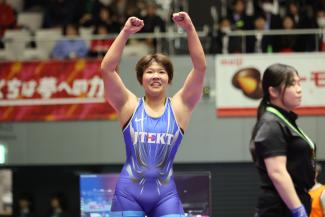
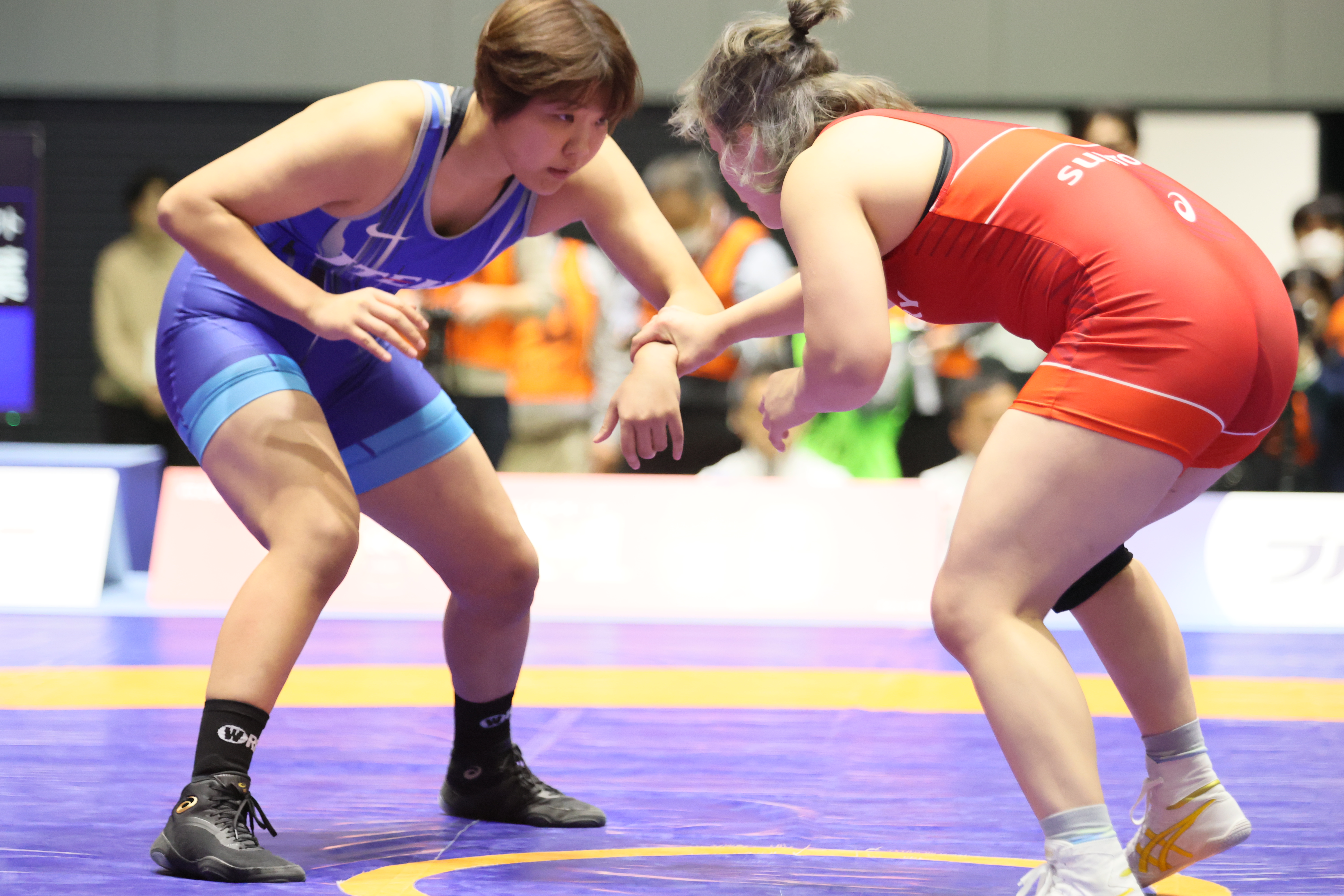 Yasuha MATSUYUKI, left, fends off Paris Olympic champion Yuka KAGAMI in the women's 76kg final. (Photo: Takeo Yabuki / wrestling-spirits.jp)
Yasuha MATSUYUKI, left, fends off Paris Olympic champion Yuka KAGAMI in the women's 76kg final. (Photo: Takeo Yabuki / wrestling-spirits.jp)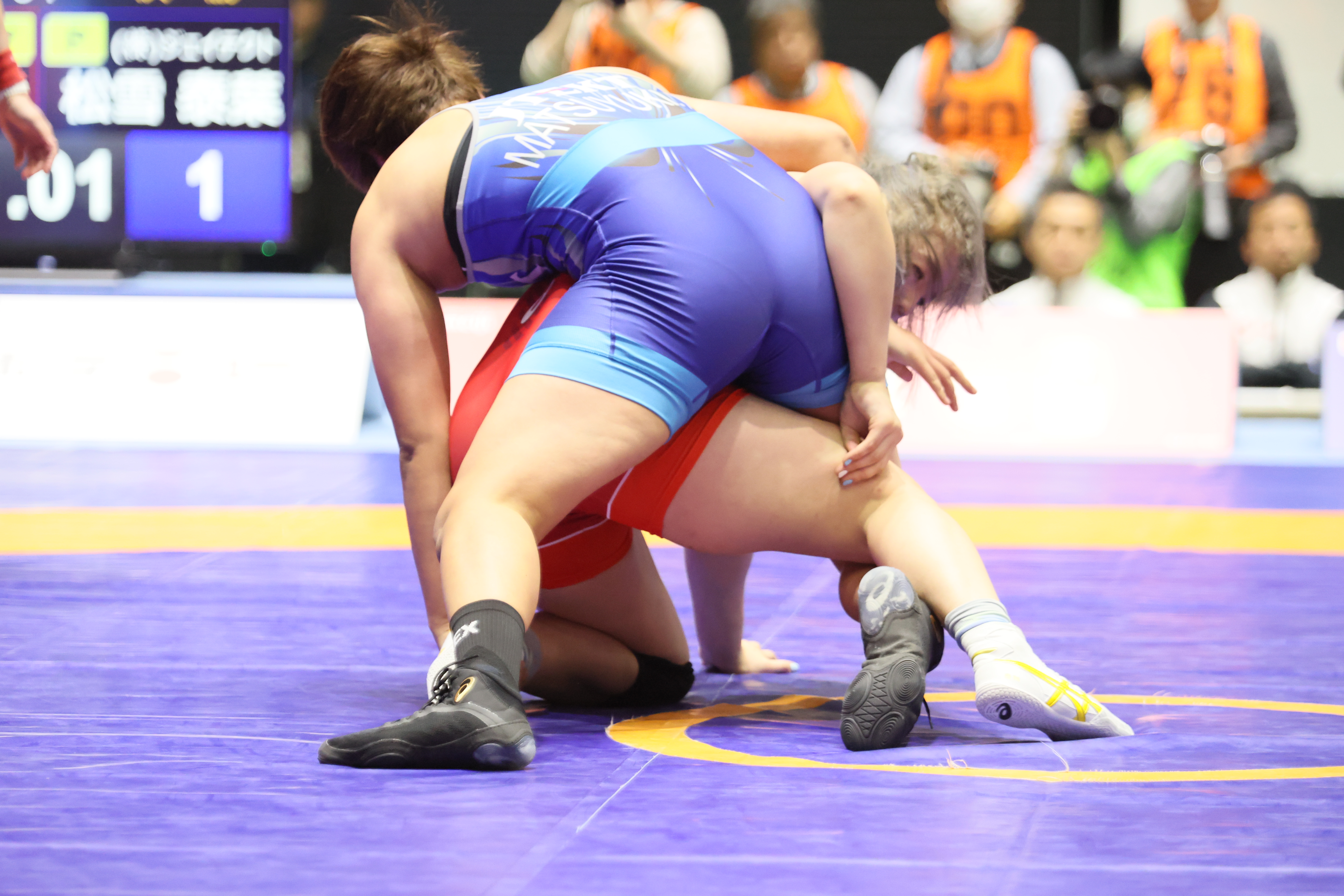 Yasuha MATSUYUKI, top, completes the winning takedown in the final seconds of the women's 76kg final. (Photo: Takeo Yabuki / wrestling-spirits.jp)
Yasuha MATSUYUKI, top, completes the winning takedown in the final seconds of the women's 76kg final. (Photo: Takeo Yabuki / wrestling-spirits.jp)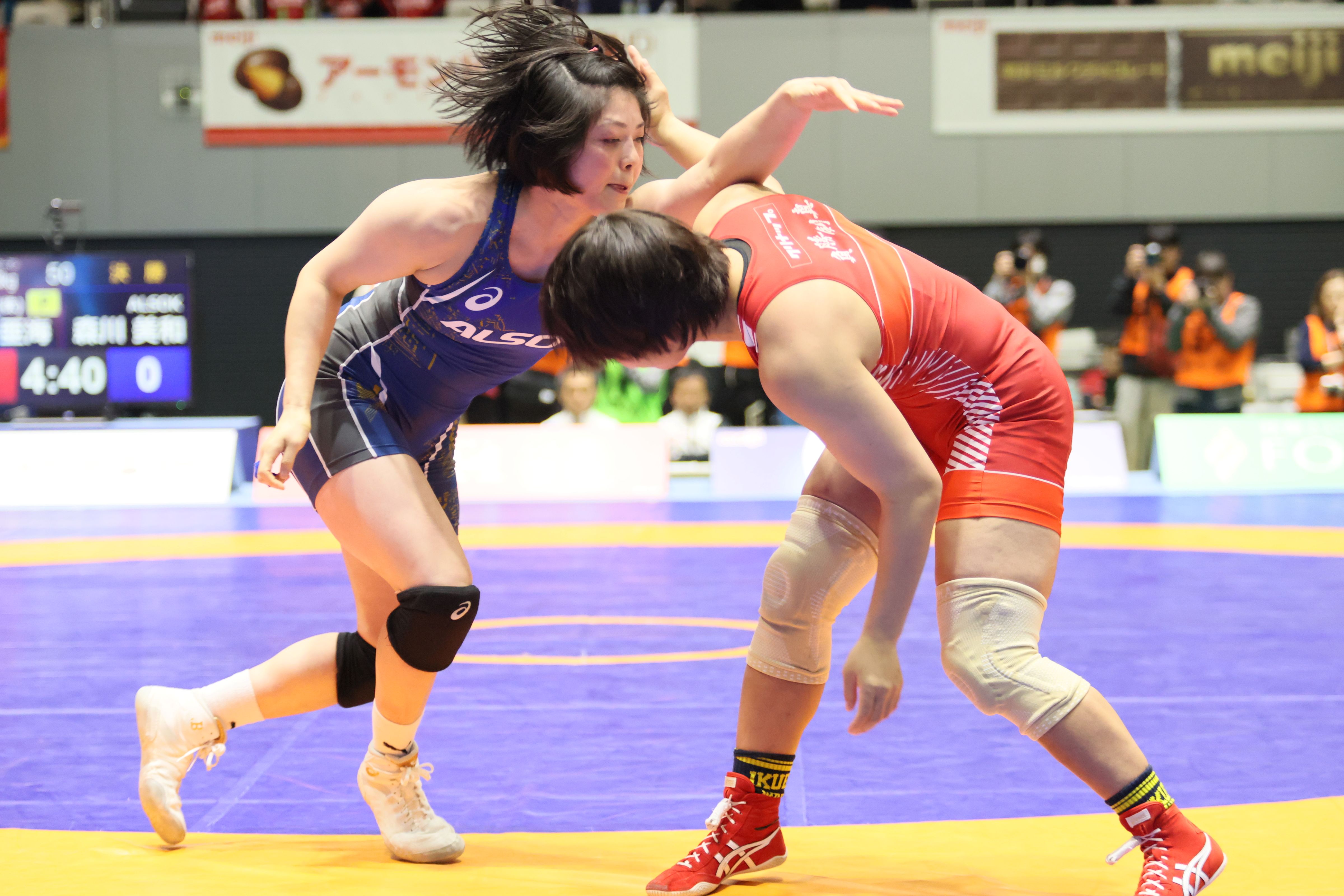 Reigning world champions Miwa MORIKAWA, left, and Ami ISHII battle in the women's 68kg final. (Photo: Takeo Yabuki / wrestling-spirits.jp)
Reigning world champions Miwa MORIKAWA, left, and Ami ISHII battle in the women's 68kg final. (Photo: Takeo Yabuki / wrestling-spirits.jp)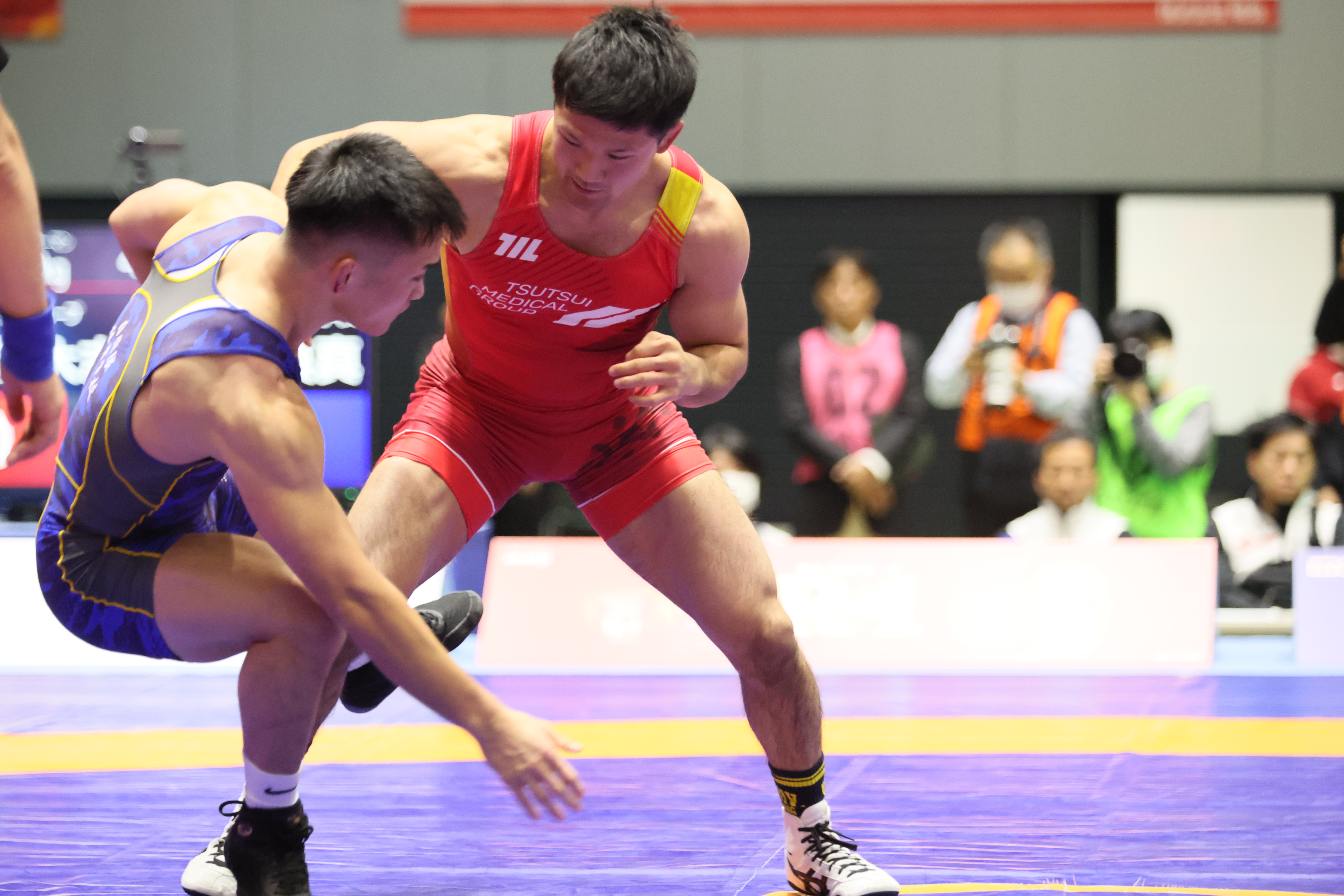 Taishi NARIKUNI, right, knocks Ryoma HOJO temporarily off balance during the Greco 72kg final. (Photo: Takeo Yabuki / wrestling-spirits.jp)
Taishi NARIKUNI, right, knocks Ryoma HOJO temporarily off balance during the Greco 72kg final. (Photo: Takeo Yabuki / wrestling-spirits.jp)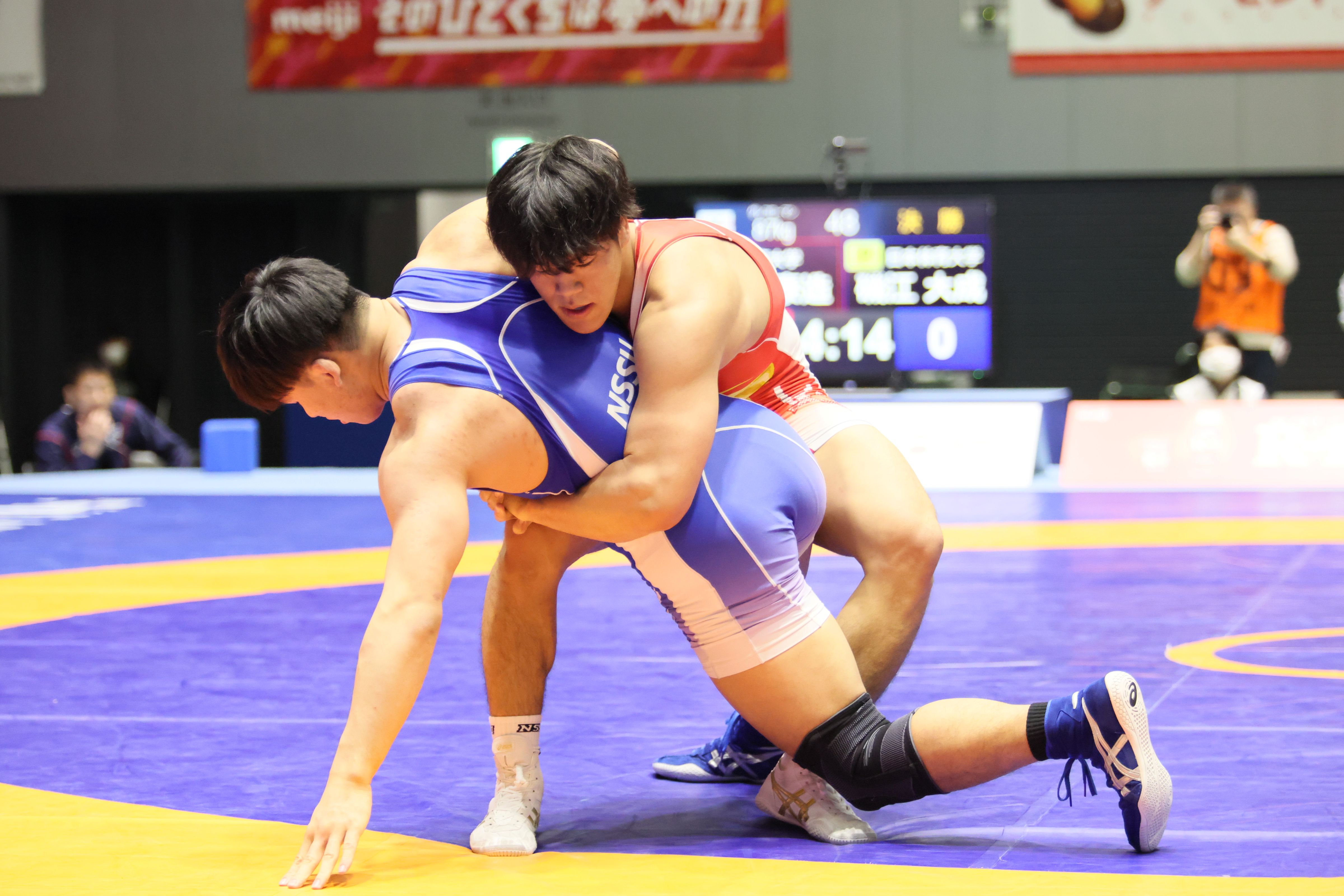 Taizo YOSHIDA, right, gets a grip on Daisei ISOE, but is unable to complete the lift. (Photo: Takeo Yabuki / wrestling-spirits.jp)
Taizo YOSHIDA, right, gets a grip on Daisei ISOE, but is unable to complete the lift. (Photo: Takeo Yabuki / wrestling-spirits.jp)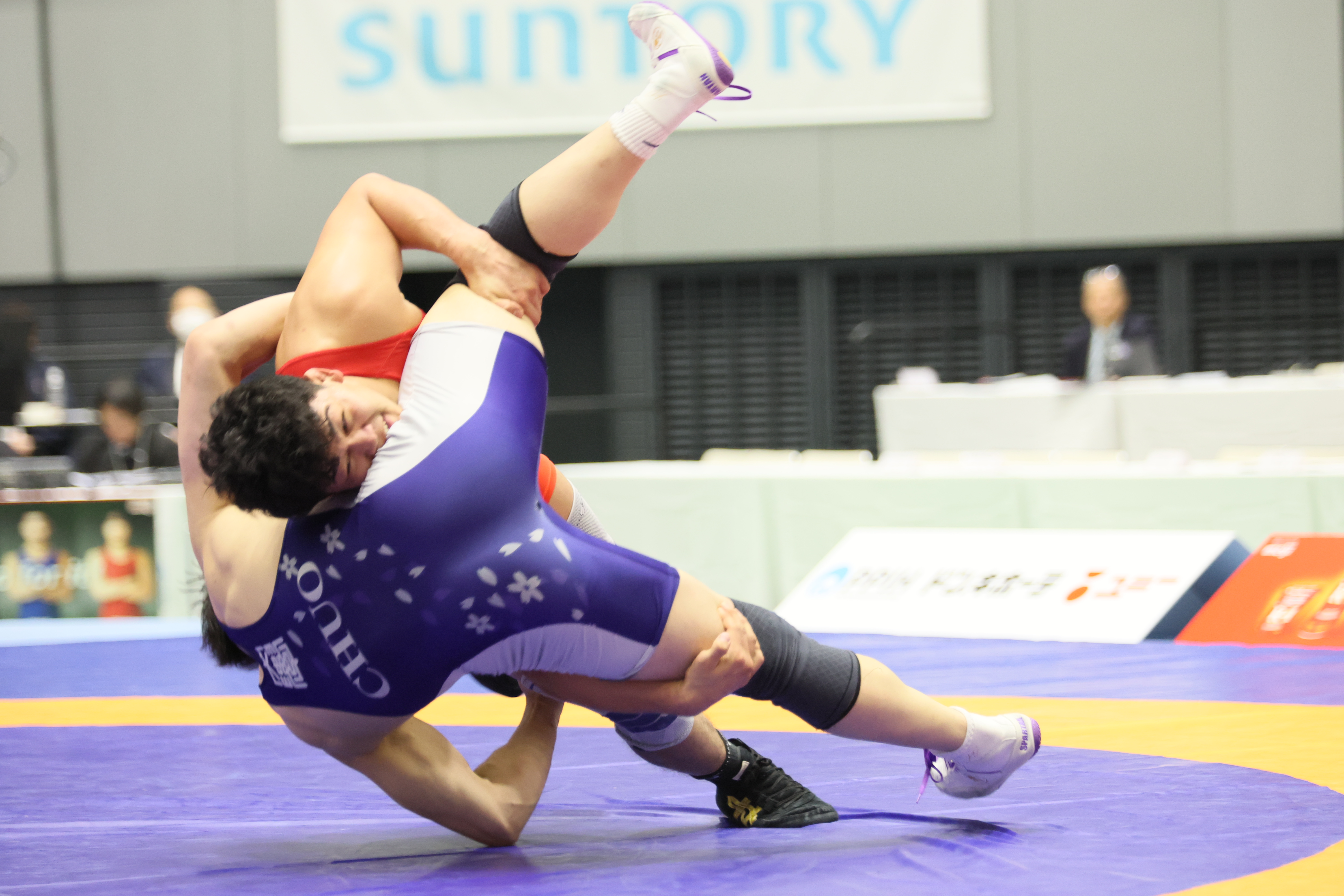 Arash YOSHIDA completes a takedown to the back against Toyoki HAMADA in their freestyle 97kg semifinal. (Photo: Takeo Yabuki / wrestling-spirits.jp)
Arash YOSHIDA completes a takedown to the back against Toyoki HAMADA in their freestyle 97kg semifinal. (Photo: Takeo Yabuki / wrestling-spirits.jp)
Share your thoughts.
Comments